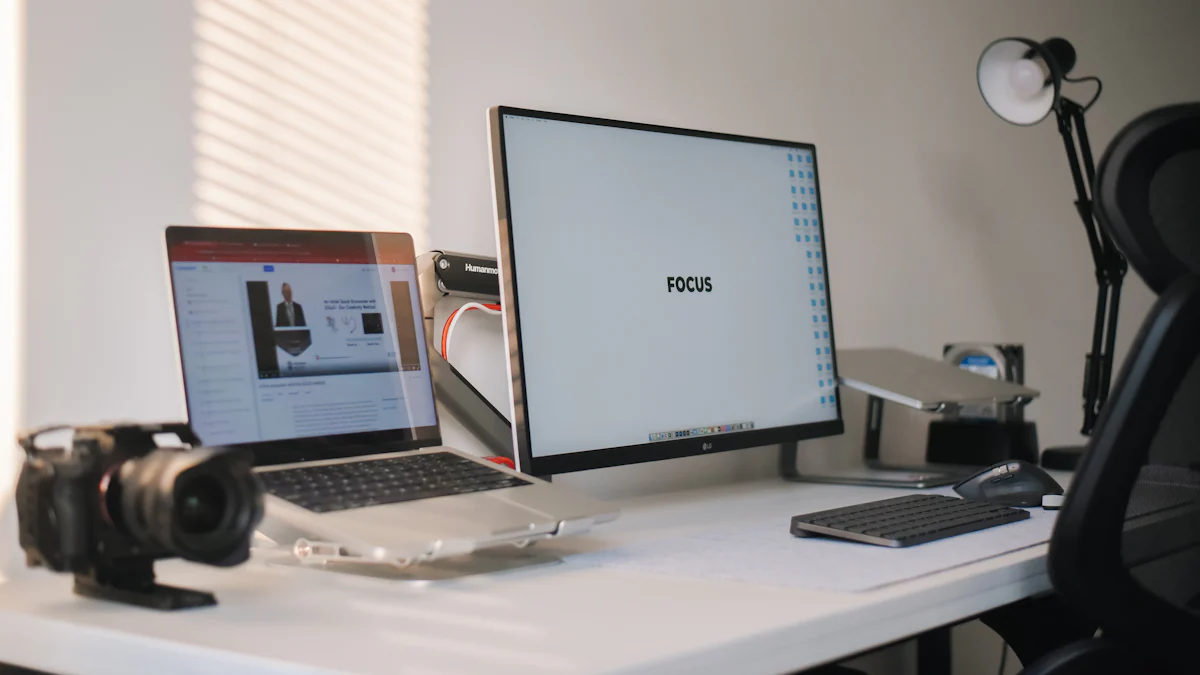


A Clean Desk Policy ensures that you leave your workspace tidy and free of clutter. This practice is crucial in modern workplaces, where maintaining security and efficiency is paramount. By keeping your desk organized, you protect sensitive information from unauthorized access. In fact, 82% of data breaches involve human-related elements, highlighting the importance of vigilance. A clean desk not only safeguards data but also boosts productivity by minimizing distractions. With compliance standards like HIPAA and SEC regulations requiring such policies, adopting a Clean Desk Policy becomes essential for both security and operational efficiency.
Understanding Clean Desk Policy
Definition and Origin of Clean Desk Policy
Historical Background
The concept of a Clean Desk Policy dates back to the early days of office work. Back then, businesses recognized the need to protect sensitive information. You might find it interesting that even in the past, companies understood the importance of keeping workspaces tidy. This practice wasn't just about cleanliness; it was about safeguarding critical data. As workplaces evolved, so did the methods for ensuring security and efficiency.
Evolution in Modern Workplaces
In today's fast-paced world, the Clean Desk Policy has become more relevant than ever. Modern workplaces focus on protecting sensitive information, including passwords and confidential documents. You see, this policy isn't just a cleaning routine. It plays a crucial role in enhancing workplace efficiency and data security. By adopting these practices, you contribute to a more organized and professional environment. Plus, it helps your company comply with data protection regulations.
Core Principles of Clean Desk Policy
Security Measures
Security stands at the heart of the Clean Desk Policy. When you leave your desk, make sure to secure all sensitive materials. This includes locking away documents and logging off computers. By doing so, you reduce the risk of unauthorized access. Remember, protecting sensitive information is not just a company requirement; it's a personal responsibility. You play a vital role in preventing data breaches and maintaining a secure work environment.
Organizational Efficiency
A Clean Desk Policy also boosts organizational efficiency. When your workspace is clutter-free, you can focus better on tasks. You won't waste time searching for misplaced items. Instead, you'll find everything you need right where it should be. This approach not only improves your productivity but also creates a more professional atmosphere. By keeping your desk organized, you contribute to a smoother workflow and a more efficient workplace.
Benefits of a Clean Desk Policy

Enhanced Security of Clean Desk Policy
Protection of Sensitive Information
You play a crucial role in protecting sensitive information by following a Clean Desk Policy. When you leave your workspace tidy, you ensure that confidential documents and data stay secure. This practice prevents unauthorized access and reduces the risk of information theft. By keeping your desk clear, you contribute to a safer work environment where sensitive materials are less likely to fall into the wrong hands.
Reduction of Data Breaches
Data breaches often occur due to human error. A Clean Desk Policy helps you minimize these risks. By securing documents and logging off computers, you actively reduce the chances of data breaches. This simple habit can make a significant difference. Remember, protecting your company's data starts with you. A clean desk is not just about appearance; it's a vital part of maintaining security.
Increased Productivity
Improved Focus
A clutter-free desk enhances your focus. When your workspace is organized, distractions decrease, allowing you to concentrate better on tasks. You won't waste time searching for misplaced items. Instead, everything you need is right at your fingertips. This clarity boosts your productivity and helps you achieve more in less time.
Time Management
A Clean Desk Policy streamlines your work process. Did you know that employees often spend almost an hour each day searching for missing documents? By keeping your desk organized, you save valuable time. Digitizing files and maintaining order means you can find what you need quickly. This efficiency not only improves your workflow but also supports a more productive workday.
Implementing a Clean Desk Policy
Implementing a Clean Desk Policy involves several key steps to ensure its success and effectiveness in your workplace. By following these steps, you can create a secure and efficient environment that benefits everyone.
Steps to Develop a Policy
Assessing Workplace Needs
First, you need to assess the specific needs of your workplace. Every organization is unique, so understanding what works best for your team is crucial. Consider the types of sensitive information handled daily and identify areas where security could be improved. This assessment helps you tailor the policy to fit your organization's requirements.
Drafting Guidelines
Once you've assessed your needs, it's time to draft clear and concise guidelines. These guidelines should outline what is expected from employees regarding desk cleanliness and security. Make sure to include specific actions, such as locking away documents and logging off computers. Clear communication is essential here. Employees should easily understand what they need to do to comply with the policy.
Employee Training and Compliance
Conducting Workshops
Training plays a vital role in the successful implementation of a Clean Desk Policy. Conduct workshops to educate employees about the importance of the policy and how to follow it effectively. Use these sessions to demonstrate best practices and answer any questions. Engaging employees through interactive workshops ensures they understand their role in maintaining a secure workspace.
Monitoring and Feedback
After training, continuous monitoring and feedback are necessary to maintain compliance. Regularly check workspaces to ensure adherence to the policy. Provide constructive feedback to employees, highlighting areas for improvement. Encourage open communication, allowing employees to share their experiences and suggestions. This ongoing dialogue fosters a culture of accountability and continuous improvement.
By following these steps, you can implement a Clean Desk Policy that enhances security and efficiency in your workplace. Remember, the key to success lies in clear communication, supportive resources, and ongoing education. With leadership endorsement and employee participation, your organization can enjoy the benefits of a clean and organized workspace.
Challenges in Maintaining a Clean Desk Policy
Implementing a Clean Desk Policy can be a game-changer for your workplace, but it doesn't come without its challenges. Let's dive into some common hurdles you might face and how to overcome them.
Employee Resistance
Resistance from employees is a common challenge when introducing a Clean Desk Policy. You might notice some employees hiding their belongings or avoiding electronic devices in favor of traditional office equipment. This resistance often stems from concerns about privacy or the inconvenience of changing habits.
Addressing Concerns
To address these concerns, start by having open conversations with your team. Ask them about their worries and listen actively. You can reassure them by explaining the benefits of the policy, like enhanced security and increased productivity. Highlight how a clean desk can protect sensitive information and create a more organized workspace. By addressing their concerns directly, you build trust and encourage cooperation.
Encouraging Participation
Encouraging participation involves making the policy feel like a team effort. You can do this by involving employees in the policy's development. Ask for their input on guidelines and procedures. When they feel included, they're more likely to embrace the change. Consider offering incentives or recognition for those who consistently maintain a clean desk. A little encouragement goes a long way in fostering a positive attitude toward the policy.
Consistency in Enforcement
Maintaining consistency in enforcing a Clean Desk Policy is crucial for its success. Without regular checks, the policy might lose its effectiveness over time.
Regular Audits
Conducting regular audits helps ensure compliance. Schedule routine checks of workspaces to see if employees are following the guidelines. These audits don't have to be intrusive; they can be quick and friendly reminders. By keeping everyone accountable, you reinforce the importance of the policy and its role in maintaining a secure environment.
Continuous Improvement
Continuous improvement is key to overcoming challenges. Encourage feedback from employees about the policy's effectiveness. Use their insights to make necessary adjustments. This ongoing dialogue creates a culture of continuous improvement, where everyone feels invested in the policy's success. By adapting and evolving, you ensure the Clean Desk Policy remains relevant and effective.
By addressing employee resistance and ensuring consistent enforcement, you can overcome the challenges of maintaining a Clean Desk Policy. Remember, open communication and a willingness to adapt are your best tools in this journey.
Case Studies of Successful Implementation of Clean Desk Policy
TechCorp
Strategies Used
At TechCorp, you’ll find a well-executed Clean Desk Policy that transformed their workspace. They started by assessing their specific needs, focusing on sensitive data protection. Employees received training through interactive workshops, making the policy easy to understand and follow. TechCorp also introduced digital solutions for document management, reducing paper clutter. Regular audits ensured everyone stayed on track.
Outcomes Achieved
The results at TechCorp were impressive. You’d notice a significant boost in productivity and focus among employees. With fewer distractions, teams completed tasks more efficiently. Security improved as well, with a noticeable reduction in data breaches. Employees became more aware of their role in maintaining a secure environment, contributing to a culture of accountability.
FinServe
Challenges Faced
FinServe faced some hurdles when implementing their Clean Desk Policy. You might have seen resistance from employees who were used to traditional ways of working. Concerns about privacy and the inconvenience of changing habits were common. FinServe also struggled with consistency in enforcement, as not all departments adhered to the guidelines equally.
Lessons Learned
From these challenges, FinServe learned valuable lessons. Open communication became key. By addressing employee concerns directly, they built trust and encouraged participation. Involving employees in policy development made them feel valued and invested. FinServe also realized the importance of continuous improvement. Regular feedback and adjustments kept the policy relevant and effective, ensuring long-term success.
Tools and Resources for a Clean Desk Policy

To successfully implement a Clean Desk Policy, you need the right tools and resources. These tools help you maintain an organized and secure workspace, making it easier to comply with the policy.
Digital Solutions of Clean Desk Policy
Software for Document Management
Digital document management software plays a crucial role in maintaining a clean desk. By using these tools, you can store and organize documents electronically, reducing the need for physical paper. This not only helps in keeping your desk clutter-free but also enhances data security. You can easily access files without rummaging through piles of paper. Plus, digital storage solutions often come with backup features, ensuring that your important documents remain safe and retrievable.
Security Applications
Security applications are essential for protecting sensitive information. These apps help you secure your digital workspace by providing features like password protection and encryption. By using security applications, you can prevent unauthorized access to your files and data. This adds an extra layer of protection, ensuring that your information remains confidential. With these tools, you can confidently leave your desk knowing that your digital assets are secure.
Physical Tools of Clean Desk Policy
Organizational Supplies
Organizational supplies are vital for maintaining a tidy workspace. Items like filing cabinets, drawers, and shelves help you store documents and office supplies neatly. By using these tools, you can keep your desk free from clutter, making it easier to find what you need. Organizational supplies also contribute to a more professional appearance, enhancing the overall look of your workspace. When everything has its place, you can focus better on your tasks.
Secure Storage Options
Secure storage options are a must for protecting sensitive materials. Lockable storage solutions, such as cabinets and drawers, provide a safe place to store confidential documents and personal items. By using secure storage, you reduce the risk of unauthorized access and information theft. These tools ensure that your workspace remains secure, even when you're not around. With secure storage, you can comply with the Clean Desk Policy while safeguarding your valuable information.
By utilizing these digital and physical tools, you can effectively implement a Clean Desk Policy. These resources not only help you maintain an organized workspace but also enhance security and efficiency. With the right tools, you can create a productive and secure work environment.
Future of Clean Desk Policy
As workplaces evolve, so does the Clean Desk Policy. You might wonder how this policy will adapt to future trends and security needs. Let's explore what lies ahead.
Trends in Workplace Organization
Remote Work Considerations
Remote work has become a significant part of modern employment. You may find yourself working from home more often, which presents unique challenges for maintaining a clean desk. A clutter-free workspace at home can reduce distractions and enhance focus. Research shows that visual disarray affects concentration, so keeping your home office tidy is crucial. Implementing a Clean Desk Policy at home helps you stay organized and productive, even when you're away from the traditional office setting.
Technological Advancements
Technology continues to shape how we work. You might notice that digital tools are becoming more integrated into daily tasks. These advancements support a paperless office environment, reducing the need for physical documents. By digitizing files, you minimize clutter and improve efficiency. This shift not only benefits productivity but also aligns with the Clean Desk Policy's goals. As technology evolves, expect more innovative solutions to help you maintain an organized workspace.
Evolving Security Needs
Cybersecurity Integration
With the rise of digital workspaces, cybersecurity becomes increasingly important. You play a vital role in protecting sensitive information. Integrating cybersecurity measures into the Clean Desk Policy ensures that both physical and digital data remain secure. Using security applications and password protection helps safeguard your digital assets. As cyber threats evolve, staying informed and proactive is essential for maintaining a secure work environment.
Policy Adaptations
Adapting the Clean Desk Policy to meet changing needs is crucial. You might see updates to guidelines as new challenges arise. Continuous improvement ensures the policy remains relevant and effective. By staying flexible and open to change, you contribute to a culture of security and efficiency. Regular feedback and adjustments keep the policy aligned with current trends and security requirements.
A Clean Desk Policy is more than just tidiness; it enhances security and boosts productivity. By adopting this policy, you create a calm and focused work environment. Encourage your business to embrace these practices. Regular communication and education ensure everyone stays informed and compliant. This proactive approach fosters a culture of awareness and efficiency. As you implement these strategies, you'll notice improved job satisfaction and reduced stress. A clean desk isn't just about appearance—it's about creating a better workplace for everyone.
FAQ
A Clean Desk Policy requires you to keep your workspace tidy and free of clutter. This means securing loose papers and confidential documents before leaving your desk. The policy aims to enhance data security and improve workplace efficiency.
Implementing this policy helps protect sensitive information from unauthorized access. It also boosts productivity by reducing distractions. A neat workspace supports compliance with data protection regulations, ensuring personal information remains secure.
By requiring you to clear your desk of sensitive materials, the policy minimizes the risk of information theft. It acts as a proactive measure against data breaches, especially in environments where confidential data is handled regularly.
The policy encourages a clutter-free workspace, which can lead to increased productivity and efficiency. It also enhances information security and helps businesses comply with data protection laws. A clean desk fosters a professional atmosphere and supports a more organized work environment.
Start by putting the policy in writing and communicating it clearly to all employees. Conduct workshops to educate staff on its importance. Regular spot checks can help ensure compliance. Encourage participation by involving employees in the policy's development and offering incentives for adherence.
You might encounter resistance from employees who are used to traditional work habits. Consistency in enforcement can also be a challenge. Address these issues by fostering open communication and involving employees in the policy's creation. Regular feedback and adjustments can help maintain its effectiveness.
Yes, it can. Even in a home office, maintaining a clutter-free workspace reduces distractions and enhances focus. Implementing the policy at home helps you stay organized and productive, aligning with the goals of a Clean Desk Policy.
Continue Reading About Clean Desk Policy
10 Game-Changing Project Management Reporting Types!
Unlock project success with 10 must-know reporting types! Track progress, manage risks, and stay on budget like a pro.
Lewis
Mar 03, 2025
10 Must-Have Marketing Agency Reporting Tools for Your Success
Optimize your agency's performance with top reporting tools. Explore analytics, social media, SEO, and more for data-driven decisions and efficiency.
Lewis
Oct 09, 2024
15 Best Software Reporting Tools for 2025
Explore the top 15 software reporting tools for 2025. Compare features, pricing, and usability to find the best fit for your business needs.
Lewis
Oct 08, 2024
2025 Data Pipeline Examples: Learn & Master with Ease!
Unlock 2025’s Data Pipeline Examples! Discover how they automate data flow, boost quality, and deliver real-time insights for smarter business decisions.
Howard
Feb 24, 2025
2025 Best Data Integration Solutions and Selection Guide
Explore top data integration solutions for 2025, enhancing data management and operational efficiency with leading platforms like Fivetran and Talend.
Howard
Dec 19, 2024
Augmented Analytics: Unlock the Core Concepts & Benefits!
Discover augmented analytics—where AI and ML automate data prep and insights, revolutionizing decision-making for smarter, faster business strategies!
Lewis
Mar 04, 2025


